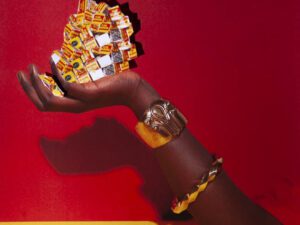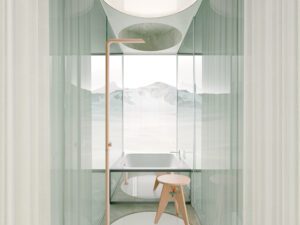London-based Canadian artist Alias Trate is interested in visualising the human condition. Working from his subconscious, the painter creates abstract works that are full of colour and emotion. Technicolour Malaise is Trate’s new virtual exhibition – offering an immersive window into his practice.
A: What is the importance of colour in your works?
AT: Colour evokes emotion. My work deals with the primacy of emotion through colour.
A: Are your paintings based on specific subjects or people? If not, what inspires you?
AT: My works are reimagined amalgams of traits, people and emotions, rather than portraits. A hyperactive imagination inspires me – interchangeably distilling and deforming what I feel and see.
A: The images feature contorted faces and fluid bodies. What is the significance of using abstracted forms?
AT: Free from the weight and conformity of reality, these reimagined forms reveal elements of the human condition that would otherwise elude us.
A: You have said before that painting is a way to delve into your subconscious. Can you expand on this?
AT: The act of painting is instinctual for me, rather than cerebral. I make no preparatory drawings, nor do I decide in advance what I am going to paint. The physical act of mixing oils, laying colour upon colour, and transforming human features provides a raw channel to delve into my subconscious. It renders intelligible my inner emotions and dreamlike memories of traits and individuals. Shapes, shades, contours – and ultimately meaning – emerge organically as each work progresses.
A: What sorts of contemporary themes do your paintings explore? Ethereal Consumption looks at digital excess, for example.
AT: For me, themes tend to emerge or become clearer after I finish a work. When I stand in front of a canvas to absorb the colours and feel the emotion, I start to see how my sensibilities, desires and preoccupations manifest themselves in the work. The painting you mention, Ethereal Consumption, does evoke a sense of aesthetic dependence or a disillusionment with the vacuity of shiny objects flashing across our screens.
A: Let’s talk about the 360 exhibition, Technicolour Malaise. What can visitors expect in terms of an immersive experience?
AT: Raw form. Colour. Emotion. The sounds of kids playing in parks in a far-off city. Space to breathe, move and reflect.

A: What can digital shows offer us at this time of isolation?
AT: They offer access to a parallel aesthetic existence outside the four walls that confine us.
A: What do you hope audiences take away from Technicolour Malaise?
AT: Every time I finish a work, I stare at the wet canvas. If the painting draws me in and speaks to me as a living being, I have to let the work live. If not, I feel a need to destroy the it. My surviving paintings are living beings, capable of independent communication and I hope audiences are able to engage with the works in this way.
A: In what direction are you looking to take your work into the future?
AT: Being in quarantine has focused my thoughts on the struggle to balance rationality and virtue against passion and baser tendencies towards irrational, destructive pursuits. This struggle to balance vice-ridden and virtue-seeking sides is increasingly finding its way onto my canvases. My next collection will showcase this. In doing so, these works will indirectly offer homage to the mythical origins of this struggle – Apollo and Dionysus, the Greek gods symbolising the challenging interplay of reason and passion.
Visit the virtual gallery here.
Lead image and final image: Installation views of Alias Trate, TECHNICOLOUR MALAISE, 2020. Courtesy the artist.
Gallery images: 1. Alias Trate – Metacognition, 2019. Oil on canvas, 150 x 90 cm.
2. Alias Trate – Death’s Dream Kingdom, 2019. Oil on canvas, 150 x 90 cm.







